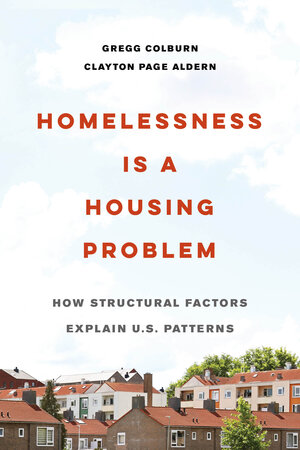Few topics provoke the combined feelings of anger and futility the way that homelessness does. One mayor says he’s going to be aggressive and “clean it up,” the next mayor says he’ll “solve it” with permanent housing. Both approaches can make you mad as you can call it too mean or too permissive, but either way, you still end up with a very large homeless population in your city. This is an issue that’s personal for me, as I worked for a homeless shelter that serves families in San Francisco for two years.
There’s a new book out on the topic that is a must-read, “Homelessness is a Housing Problem” by Gregg Colburn and Clayton Page Aldern. Usually with these reviews, I write about other fiction in my genre, which is humorous and faith-based coming-of-age stories. But this one deserves attention now for two reasons – it helps with the feelings of futility about homelessness, and in my state (Washington), the legislature is planning to take up the issue of housing in the new year and it would really help if citizens got involved.
This is a non-fiction book that summarizes a big multiple regression the authors did on homelessness statistics in U.S. cities, comparing the landscape and approaches that are used in different regions and seeing which factors have a correlation with the homelessness rate.
The authors make it quite easy to find the thesis. It’s right there in the title. It is the title.
Their analysis looks at many possible causes of homelessness and sees whether the homelessness rates of cities seem to correlate with the cause. For example, they ask, “If the weather is milder, does homelessness go up?” No. If drug abuse is higher, does homelessness go up? Also no, which struck me as counterintuitive until they explain that most drug users aren’t homeless and most homeless people aren’t drug users. Sure, it could be an individual risk factor, but not a citywide one. The same goes for rates of mental health problems, poverty, employment, and race. The poverty one surprised me because I thought if more people are poor, more people will be homeless. But the authors point out that the places in the United States with the lowest homelessness rates include Mississippi, West Virginia, and Detroit. There are plenty of poor people there, but housing is available and affordable.
They also look at right-to-shelter laws that exist in places such as Minneapolis and New York City, where the city is obligated to provide an emergency shelter bed for everyone who needs one. Seattle and San Francisco don’t have such laws. Does it make people say, “Look at all those cots in New York. I’ll be homeless there”? No, it doesn’t have an effect on the homelessness rate because people in emergency shelters are still counted as homeless. San Francisco has more unsheltered homeless people, but this difference doesn’t affect the overall homelessness rate.
And that brings us back to housing. Cities such as Seattle, San Francisco, New York, and Washington DC have higher rates of homelessness than cities in the interior such as St. Louis, Minneapolis, and Cleveland. The reason is that housing is much more affordable there than it is in high-priced cities on the coasts, and there’s a very strong correlation between those two factors.
So what’s the solution? Housing. If you want the homelessness rate to go down, you have to increase the supply of housing, especially affordable housing. What makes this especially difficult to do is that English democracy (antecedent to our democracy) was founded by landowners as a plot to protect private property, and our system has all kinds of traits baked into it that make it easy for property owners to run up the price of housing by restricting supply, that is, not allowing new buildings to be constructed because it would “change the character” of the neighborhood. Colburn and Aldern, being good researchers, propose complicated solutions including more rental subsidies for housing for people who are on the brink of becoming homeless, building more affordable housing, making it easier to build affordable housing, and an assortment of other stuff I didn’t understand that well. I would add one more thing there – we absolutely must quit allowing the neighbors to torpedo plans to construct new housing. Trailer parks and single-resident occupancy hotels aren’t anyone’s favorite, but they do provide safe housing. And unless communities are willing to meet the demand for housing, they shouldn’t be allowed to restrict supply.
In short, “Homelessness Is a Housing Problem” is a good book. If you watched the documentary “Seattle is Dying” and thought it missed the point but you were frustrated you didn’t know how to redirect people’s attention to the real problem, this book is for you.

